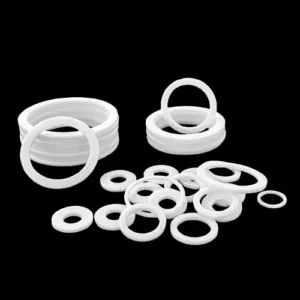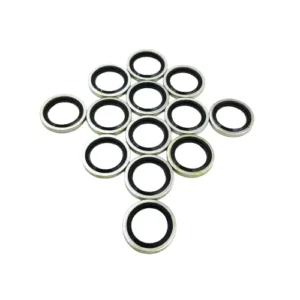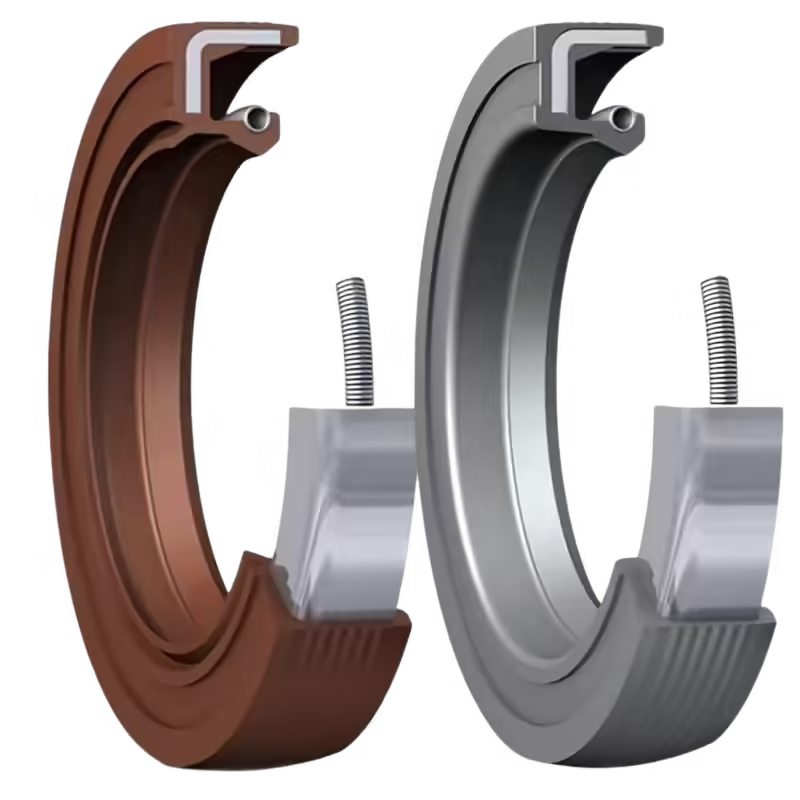Custom Gaskets Manufacturer: Comprehensive Guide to Custom Gaskets


1. Introduction
Importance of Custom Gaskets
Custom gaskets are indispensable components across various industrial sectors, including automotive, aerospace, oil and gas, and pharmaceutical industries. They play a critical role in ensuring that equipment and machinery are properly sealed, preventing leaks of liquids or gases. This sealing capability not only maintains the integrity and efficiency of systems but also safeguards against environmental contamination and operational hazards. Without reliable custom gaskets, industries would face increased maintenance costs, reduced equipment lifespan, and heightened safety risks.
Emergence of Custom Gaskets Manufacturers
As industrial applications have grown more complex and diverse, the demand for specialized sealing solutions has surged. Standard gaskets often fall short in meeting the unique requirements of specific applications, leading to the rise of custom gaskets manufacturers. These manufacturers address the intricate and varied needs of different industries by providing tailored gasket solutions that are precisely engineered to fit specific conditions. By offering customized products, they ensure optimal performance, enhanced reliability, and greater efficiency in sealing critical systems.
2. What is a Gasket?
Definition and Purpose
A gasket is a mechanical seal that fills the space between two or more mating surfaces, typically to prevent leakage from or into the joined objects while under compression. Gaskets are essential in maintaining the integrity of various systems by ensuring that fluids and gases remain contained within designated pathways. They help in avoiding contamination, pressure loss, and fluid leakage, thereby ensuring the smooth operation of machinery and equipment.
Common Types and Materials
Custom gaskets come in a multitude of types and materials, each suited to specific applications based on their properties:
- Rubber Gaskets: Known for their flexibility and ability to form tight seals, rubber gaskets are commonly used in applications where there is a need for vibration damping and resilience against minor movements.
- Metal Gaskets: These are ideal for high-temperature and high-pressure environments. Metal gaskets offer excellent durability and are often used in automotive engines and industrial machinery.
- Silicone Gaskets: With their superior thermal stability and chemical resistance, silicone gaskets are perfect for applications involving extreme temperatures and harsh chemicals.
- Cork Gaskets: Lightweight and compressible, cork gaskets are typically used in low-pressure applications where a soft seal is sufficient.
- Composite Gaskets: Combining different materials, composite gaskets offer a balance of properties, making them versatile for various industrial uses.
Applications
The choice of gasket material and type depends on the specific industrial application. For instance, rubber gaskets are suitable for sealing in plumbing and automotive systems, while metal gaskets are preferred in high-temperature engine compartments and industrial pressure vessels. Silicone gaskets find their use in aerospace and electronics, where precise and resilient sealing is crucial. Each material’s unique properties make custom gaskets adaptable to a wide range of operational environments and requirements.
3. What Makes a Manufacturer “Custom”?
Definition of Custom Manufacturing
Custom manufacturing refers to the ability to design and produce gaskets that meet the specific requirements of individual clients. Unlike standard gaskets, which are mass-produced with fixed dimensions and materials, custom gaskets are tailored to fit unique applications, ensuring optimal performance and reliability.
Differences from Standard Gaskets
Custom gasket manufacturers offer significant flexibility in several key areas:
- Size and Shape: Custom gaskets can be designed in various sizes and shapes to fit unconventional or non-standard joints and surfaces.
- Material Selection: Manufacturers can choose from a broader range of materials to suit specific environmental conditions, such as extreme temperatures or corrosive substances.
- Thickness and Density: Adjusting the thickness and density of gaskets allows for better sealing performance and adaptability to different compression levels.
- Application-Specific Features: Custom gaskets can incorporate features like specific grooves, embedded elements, or unique surface finishes to enhance their sealing capabilities.
Benefits of Customization
Customization offers numerous advantages:
- Precision: Custom gaskets are designed to exact specifications, ensuring a perfect fit and effective sealing.
- Adaptability: They can accommodate complex or non-standard applications that standard gaskets cannot handle.
- Efficiency: Tailored sealing solutions lead to improved system performance and reduced risk of leaks and failures.
- Cost-Effectiveness: By addressing specific needs precisely, custom gaskets can reduce maintenance costs and extend equipment lifespan.
4. The Role of Custom Gaskets Manufacturers
Industries Served
Custom gasket manufacturers cater to a wide array of industries, each with its unique sealing requirements:
- Automotive: Sealing engines, exhaust systems, and other critical components to ensure vehicle stability and safety.
- Aerospace: Maintaining seal integrity in high-performance environments, guaranteeing reliable aircraft operations.
- HVAC (Heating, Ventilation, and Air Conditioning): Ensuring efficient and leak-free operation of heating and cooling systems.
- Oil and Gas: Sealing high-pressure systems in harsh environments, ensuring the safety of energy production and transportation.
- Pharmaceuticals: Meeting stringent sanitary and regulatory standards to ensure product safety and purity.
Processes Involved
Custom gasket manufacturers engage in several key processes:
- Product Design: Collaborating with clients to design gaskets that meet specific requirements.
- Prototyping: Creating prototype gaskets to test and refine the design.
- Testing: Conducting rigorous tests to ensure gaskets perform reliably under operational conditions.
- Collaboration: Working closely with engineers and designers to develop effective sealing solutions tailored to client needs.
Value Provided
Custom gasket manufacturers add significant value by:
- Providing Specialized Technical Support: Offering expertise in material selection, design optimization, and performance testing.
- Delivering High-Quality Products: Ensuring gaskets meet stringent quality standards for durability and reliability.
- Enhancing Equipment Performance: Reliable seals improve the overall efficiency and longevity of industrial equipment.
5. How Are Custom Gaskets Made?
Step-by-Step Process
The manufacturing of custom gaskets involves a detailed and precise process to ensure that each gasket meets the specific needs of the client. Below is an in-depth look at each step involved:
1. Consultation and Design
- Understanding Client Sealing Needs: The process begins with a thorough consultation to understand the client’s specific sealing requirements, including the application environment, operating conditions, and performance expectations.
- Designing Custom Gasket Based on Application Requirements: Using the gathered information, engineers and designers create a custom gasket design that addresses the unique challenges of the application. This may involve creating detailed drawings or CAD models to visualize the gasket’s shape and features.
2. Material Selection
- Choosing Appropriate Materials: Based on factors such as temperature, pressure, chemical exposure, and mechanical stress, the appropriate gasket material is selected. This ensures that the gasket will perform reliably under the specific operational conditions.
- Ensuring Material Compatibility: The selected material must be compatible with the fluids or gases it will seal against, as well as with the materials of the surfaces it will contact.
3. Prototyping and Testing
- Producing Prototype Gaskets: A prototype gasket is manufactured to test its fit and performance. This step allows for the identification and correction of any design flaws before full-scale production.
- Testing Fit, Durability, and Performance: The prototype undergoes rigorous testing, including pressure tests, leak tests, and durability assessments, to ensure it meets the required specifications and performance standards.
4. Cutting and Shaping
- Utilizing Cutting Techniques: Several cutting and shaping techniques are employed to manufacture gaskets with high precision:
- Die-Cutting: Custom dies are used to cut the gasket material into the desired shape with high accuracy.
- Water Jet Cutting: High-pressure water jets are used for intricate and clean cuts, suitable for complex gasket designs.
- CNC Machining: Computer-controlled machines perform precise cutting and shaping, ensuring consistency and accuracy across multiple gaskets.
- Detailed Gasket-Making Process:
- Preparing Gasket Material: The right gasket material is selected based on application requirements, ensuring compatibility with the operating environment.
- Marking and Layout: Dimensions and shapes are accurately marked on the gasket material using templates or CAD designs to ensure precision.
- Edge Finishing: The edges of the gasket are smoothed and finished to prevent fraying and ensure a perfect seal. Additional treatments, such as applying a protective coating, may be performed to enhance durability.
5. Final Production
- Mass Production with Strict Quality Control: After successful testing and any necessary adjustments, the gasket enters mass production. Strict quality control measures are implemented to maintain consistency and ensure that each gasket meets the high standards set during the prototype phase.
Modern Manufacturing Technologies
Custom gasket production leverages advanced manufacturing technologies to achieve high precision and quality:
- CNC Cutting: Computer Numerical Control (CNC) machines provide precise cutting and shaping, ensuring uniformity and accuracy.
- Laser Cutting: High-powered lasers enable intricate and clean cuts, ideal for complex gasket designs.
- 3D Printing: Additive manufacturing allows for rapid prototyping and the creation of complex geometries that may be challenging with traditional methods.
- Molding Processes: Injection molding and compression molding are used for producing gaskets with consistent shapes and dimensions.
These technologies enhance the efficiency, accuracy, and scalability of gasket production, enabling manufacturers to meet diverse and demanding client requirements effectively.
6. Can I Use an O-Ring as a Gasket?
Difference Between O-Rings and Gaskets
While both O-rings and gaskets serve the purpose of sealing joints to prevent leaks, they differ significantly in design and application:
- O-Rings: These are specific types of gaskets, typically round rings with a circular cross-section. O-rings are designed to seal cylindrical surfaces and are commonly used in applications like pipe flanges and pumps.
- Gaskets: Gaskets come in various shapes and sizes, tailored to seal different types of joints and surfaces. They are more versatile in terms of application compared to O-rings.
Advantages of O-Rings
O-rings offer several benefits in appropriate applications:
- Effective in Consistent Pressure Applications: Their design allows them to maintain a reliable seal under steady pressure conditions.
- Ideal for Sealing Cylindrical Surfaces: Perfect for applications requiring sealing around pipes, bolts, and other cylindrical components.
When to Use O-Rings as Gaskets
O-rings can be effectively used as gaskets in scenarios where:
- Tight, Reliable Seals Are Needed: Situations demanding a consistent and secure seal benefit from the inherent design of O-rings.
- Cost-Effective Sealing Solutions: O-rings provide a budget-friendly option for applications that fit their design parameters.
Limitations of O-Rings
Despite their advantages, O-rings have limitations:
- Not Suitable for Large, Irregular Surfaces: Their round shape makes them unsuitable for sealing non-cylindrical or large surface areas.
- Inadequate for High-Compression or Complex Designs: Applications requiring high compression or intricate sealing patterns demand more versatile gasket designs.
Recommendation
When considering whether to use an O-ring as a gasket, it is essential to evaluate the specific application and sealing requirements. For highly specialized sealing needs, custom gaskets are often the better option, providing the necessary flexibility and performance that O-rings cannot offer.
7. Advantages of Choosing a Custom Gaskets Manufacturer
Tailored Solutions
Custom gasket manufacturers excel in providing solutions that fit specific needs, particularly for complex or non-standard applications. This customization ensures that each gasket is perfectly suited to its intended use, enhancing overall system performance and reliability.
Enhanced Reliability and Performance
Custom gaskets are engineered to meet the precise demands of critical systems, resulting in higher efficiency and better performance. Reliable seals prevent leaks and maintain system integrity, which is essential for the smooth operation of industrial machinery and equipment.
Reduced Risk of Failures
By minimizing the chances of leaks and other sealing failures, custom gaskets contribute to extended equipment lifespan and lower maintenance costs. This reduction in failure risks translates to significant cost savings and increased operational uptime for businesses.
Diverse Material Options
Custom gasket manufacturers offer access to a wide range of materials with specialized properties, such as temperature resistance and chemical resistance. This diversity allows for the selection of the most appropriate material for each specific application, ensuring optimal performance under varying conditions.
8. Industries that Benefit from Custom Gaskets
Automotive
In the automotive industry, custom gaskets are used to seal engines, exhaust systems, and other critical components. These gaskets ensure vehicle stability and safety by preventing leaks and maintaining the integrity of engine compartments and other vital systems.
Aerospace
Aerospace applications demand high-performance sealing solutions to maintain seal integrity in extreme environments. Custom gaskets are essential for guaranteeing the reliable operation of aircraft, ensuring that all sealed components function flawlessly under high pressure and temperature variations.
Industrial Manufacturing
In industrial manufacturing, custom gaskets enhance the performance of pumps, valves, and hydraulic systems. By providing efficient and durable seals, these gaskets improve the efficiency and longevity of industrial equipment, contributing to overall operational effectiveness.
Food and Pharmaceuticals
Custom gaskets used in the food and pharmaceutical industries must meet stringent sanitary and regulatory standards. These gaskets ensure product safety and purity by preventing contamination and maintaining hygienic conditions within processing equipment.
Oil and Gas
The oil and gas industry relies on custom gaskets to seal high-pressure systems in harsh environments. These gaskets play a crucial role in ensuring the safety of energy production and transportation, preventing leaks that could lead to environmental hazards and operational disruptions.
9. Quality Control and Standards in Custom Gaskets Manufacturing
Importance of Quality Control
Quality control is paramount in gasket manufacturing to ensure that each gasket meets the required durability and performance standards. Rigorous quality control processes help prevent defects, ensuring that gaskets function reliably in their intended applications.
Common Industry Standards
Custom gasket manufacturers adhere to several industry standards to guarantee product quality:
- ISO (International Organization for Standardization): Provides standards for quality management and product specifications.
- ASTM (American Society for Testing and Materials): Offers standards for material properties and testing methods.
- SAE (Society of Automotive Engineers): Sets standards particularly relevant to automotive applications.
Testing Procedures
To validate gasket performance, manufacturers conduct various testing procedures:
- Pressure Tests: Ensure that gaskets can withstand the operating pressures without failing.
- Leak Tests: Detect any potential leaks to verify the sealing effectiveness.
- Environmental Stress Tests: Assess how gaskets perform under different environmental conditions, such as temperature fluctuations and chemical exposures.
These tests ensure that gaskets perform reliably in real-world applications, meeting the stringent demands of various industries.
10. Why Businesses Choose Custom Gaskets Manufacturers
Cost Considerations
Businesses opt for custom gasket manufacturers to balance customization with cost-effectiveness. Custom gaskets can provide the best value by addressing specific needs precisely, reducing the likelihood of costly leaks and equipment failures.
Long-Term Partnerships
Establishing long-term relationships with custom gasket manufacturers offers ongoing support and a reliable supply of high-quality gaskets. These partnerships ensure that businesses can depend on their gasket suppliers to meet their evolving sealing requirements consistently.
11. Conclusion
Critical Role of Custom Gaskets Manufacturers
Custom gasket manufacturers play a pivotal role in providing tailored, reliable sealing solutions across various industries. Their ability to design and produce gaskets that meet specific requirements ensures the smooth and efficient operation of critical systems.
Benefits of Custom Gaskets
Custom gaskets offer precision and durability, enhancing equipment performance and reliability. By addressing unique sealing needs, they contribute to the overall efficiency and longevity of industrial machinery and systems.
Recommendation for Businesses
Businesses seeking efficient sealing solutions should consider partnering with custom gasket manufacturers. These manufacturers provide the expertise and specialized products necessary to meet unique sealing requirements effectively, ensuring optimal performance and reliability in their operations.
12. Market Trends and Future Outlook
Industry Growth Projections
The global market for custom gaskets is projected to experience significant growth, driven by factors such as technological advancements and the increasing demand for industrial automation. As industries continue to evolve, the need for specialized sealing solutions will expand, further fueling market growth.
Innovation and Technological Developments
Innovations in materials and manufacturing technologies are shaping the future of gasket manufacturing. The application of high-performance composites and the integration of smart manufacturing practices, such as Industry 4.0, are enhancing the capabilities and efficiency of custom gasket production.
Regional Market Analysis
Different regions exhibit varying market characteristics and growth potentials. For example, the Asia-Pacific region is experiencing rapid growth due to its expanding industrial base and increasing investments in manufacturing and infrastructure projects.
13. Case Studies and Practical Applications
Success Stories
Numerous success stories highlight the effectiveness of custom gaskets in enhancing performance. For instance, an automotive manufacturer may utilize custom gaskets to improve engine performance by ensuring precise sealing, thereby increasing efficiency and reducing emissions.
Customer Testimonials
Feedback from clients underscores the benefits of custom gaskets. Customers often report improvements in system reliability, reduced maintenance costs, and enhanced operational efficiency after implementing custom sealing solutions.
14. Challenges and Solutions
Common Challenges
Custom gasket manufacturing faces several challenges, including:
- Manufacturing Complexities: Intricate gasket designs can be difficult to produce consistently.
- Material Selection: Choosing materials that are compatible with specific operating conditions is critical.
- Supply Chain Management: Ensuring timely delivery and managing supply chain disruptions can be challenging.
Solutions
Manufacturers address these challenges by:
- Utilizing Advanced Manufacturing Technologies: Techniques like CNC machining and laser cutting enhance precision and efficiency.
- Collaborating Closely with Clients: Effective communication ensures that design specifications are accurately met.
- Implementing Quality Management Systems: Continuous improvement and robust quality control processes help maintain high standards.
15. Environmental and Sustainability Considerations
Use of Eco-Friendly Materials
Custom gasket manufacturers are increasingly adopting eco-friendly materials, such as recyclable and environmentally friendly gasket options, to minimize environmental impact.
Environmental Measures in Production
Manufacturers implement various environmental measures in their production processes, including:
- Energy Conservation and Emission Reduction: Implementing energy-efficient practices and reducing emissions.
- Waste Management and Recycling Practices: Efficiently managing waste and promoting recycling to reduce environmental footprint.
Industry Standards and Regulations
Compliance with environmental regulations and obtaining green certifications, such as ISO 14001, demonstrate a commitment to sustainability and environmentally responsible manufacturing practices.
16. Cost and Pricing Factors
Cost Components
Several factors influence the cost of custom gaskets, including:
- Material Costs: The price of raw materials used in gasket production.
- Manufacturing Costs: Expenses related to production processes and labor.
- R&D Expenses: Costs associated with research and development for new gasket designs and materials.
Factors Influencing Pricing
- Order Quantity: Larger orders often benefit from economies of scale, reducing the per-unit cost.
- Complexity: More intricate designs may require additional manufacturing steps, increasing costs.
- Material Selection: Specialized materials with unique properties can be more expensive.
Cost Control Strategies
Manufacturers implement cost control strategies such as optimizing production processes and leveraging economies of scale in mass production to offer competitive pricing without compromising quality.
17. Certifications and Compliance
Industry Certifications
In addition to ISO, ASTM, and SAE certifications, custom gasket manufacturers may obtain other relevant certifications, such as food-grade or pharmaceutical-grade certifications, to meet industry-specific standards.
Compliance Requirements
Manufacturers must adhere to specific compliance standards tailored to different industries. Quality management system certifications, such as ISO 9001, ensure that manufacturing processes meet stringent quality criteria.
18. New Materials and Technological Innovations
Advanced Materials
The development and application of advanced materials, including high-performance composites and nanomaterials, are revolutionizing gasket manufacturing. These materials offer enhanced properties, such as increased strength, flexibility, and resistance to extreme conditions.
Manufacturing Technology Innovations
Innovative manufacturing technologies, such as additive manufacturing (3D printing) and automation with robotics, are streamlining production processes, increasing precision, and enabling the creation of complex gasket designs that were previously challenging to manufacture.
19. Customer Service and Support
Pre-Sales Support
Custom gasket manufacturers provide pre-sales support, including technical consulting and needs assessment, to help clients identify the best sealing solutions for their applications.
After-Sales Service
Comprehensive after-sales services, such as quality assurance, warranty policies, and customer training, ensure that clients receive ongoing support and maintain the optimal performance of their sealing systems.
Customization Services
Personalized design and rapid response mechanisms enable manufacturers to quickly adapt to changing client needs, ensuring that custom gaskets are delivered promptly and efficiently.
20. Digitalization and Smart Manufacturing
CAD/CAM Technologies
Computer-Aided Design (CAD) and Computer-Aided Manufacturing (CAM) technologies play a crucial role in the custom gasket manufacturing process. They enable precise design and seamless transition from design to production, ensuring accuracy and efficiency.
Internet of Things (IoT) and Data Analytics
The integration of IoT and data analytics allows manufacturers to monitor production processes in real-time, optimize operations, and maintain stringent quality control standards through data-driven insights.
Automated Production Lines
Automation and smart manufacturing techniques enhance production efficiency and consistency, reducing human error and ensuring that gaskets meet precise specifications consistently.
21. Competitive Analysis
Key Competitors
The custom gasket manufacturing industry features several leading companies known for their technological expertise, quality products, and strong customer relationships. Understanding the competitive landscape helps manufacturers identify their strengths and areas for improvement.
Competitive Advantages
Successful manufacturers differentiate themselves through:
- Technological Expertise: Advanced manufacturing capabilities and innovative design solutions.
- Customer Relationships: Strong partnerships and responsive customer service.
- Innovation Capabilities: Continuous development of new materials and manufacturing techniques.
Market Positioning
Different companies position themselves uniquely in the market based on their specialization, quality standards, and service offerings. Effective market positioning helps manufacturers attract and retain clients in a competitive environment.
22. Legal and Intellectual Property Considerations
Patents and Technology Protection
Custom gasket manufacturers often develop patented technologies to protect their unique designs and manufacturing processes. Patents safeguard intellectual property, preventing competitors from copying innovative solutions.
Intellectual Property Management
Effective intellectual property management involves strategies to prevent counterfeiting and infringement, ensuring that proprietary technologies and designs remain secure and exclusive to the manufacturer.
Contracts and Agreements
Manufacturers engage in custom agreements and non-disclosure agreements (NDAs) with clients to protect sensitive information and ensure that both parties uphold their commitments. These contracts establish clear terms for customization, production, and delivery, fostering trust and collaboration.
Summary
Custom gasket manufacturers are integral to various industries, providing tailored, reliable sealing solutions that enhance equipment performance and operational efficiency. Their ability to design and produce gaskets that meet specific requirements ensures that critical systems function smoothly and safely. By leveraging advanced materials and manufacturing technologies, maintaining rigorous quality control, and offering comprehensive customer support, custom gasket manufacturers deliver exceptional value to their clients.
In a market driven by innovation and complexity, partnering with a custom gasket manufacturer enables businesses to meet their unique sealing needs effectively. Whether addressing high-pressure environments, extreme temperatures, or specialized application requirements, custom gaskets offer precision and durability that standard gaskets cannot match. As industries continue to evolve, the role of custom gasket manufacturers will only become more crucial, ensuring that sealing solutions keep pace with technological advancements and operational demands.
For businesses seeking to optimize their sealing systems and ensure the reliability of their equipment, collaborating with a custom gasket manufacturer is a strategic investment that pays dividends in performance, safety, and cost savings.
Contact Information
For inquiries and custom gasket manufacturing solutions, visit our website: https://drorubber.com/gaskets-and-custom-products/.
WhatsApp: +0086 15815831911
WeChat: +0086 13784044874





